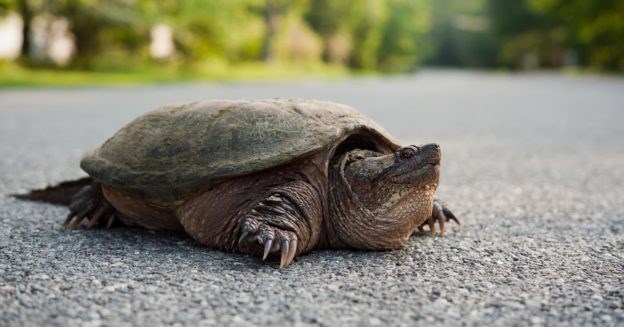NEWS RELEASE
GUELPH HUMANE SOCIETY
*************************
The Guelph Humane Society (GHS) would like to remind motorists to "give turtles a break" this time of year. Turtles are at the beginning of their egg-laying season, which will continue until early July.
Females often will lay their eggs in the sandy, gravel shoulders along our roads, then while crossing the roadways they are at significant risk of injuries or death due to collisions with vehicles.
There are eight native species of turtles in Ontario, and all are designated as either endangered, threatened, or of special concern. Road mortality is second only to habitat loss, as a contributing factor to declining populations.
The life cycle of turtles makes them very vulnerable to the loss of even a small number of adults within a population, which is why helping to ensure their safe crossing of roads is so important.
What do I do if I see a turtle crossing the road?
If it is safe to do so, please consider stopping and giving them a helping hand. Always move a turtle across the road in the direction that they are headed. For species other than snapping turtles, you can pick up the turtle with two hands, one on either side of the shell, and carefully transport them across the road. If you do not know the species of turtle that you are handling, you should handle it as if is a snapping turtle.
When handling or approaching snapping turtles, some extra caution is needed. They can give a nasty bite. Using a car mat or shovel is the easiest and safest way to move snapping turtles.
Never approach a snapping turtle from the front or side of the shell, as they have a long neck that can reach out and around their shell and potentially deliver a nasty bite. Instead, approach snapping turtles from the rear, and firmly grip the turtle at the rear of their shell, on either side of their tail, and slide them onto the car mat or shovel. You can then slide them across the road, continuing to hold them by the back of their shell, until they are safely across the road.
As a precaution, disinfect your hands afterwards, as turtles can carry salmonella.
Never pick up a turtle by the tail, as it can cause a serious injury to their spinal column.
What do I do if the turtle has been injured?
If the turtle has been injured, and it is safe to do so, remove it from the road and secure it in a box or plastic tote. Contact the Guelph Humane Society immediately. Always note the exact location of where the turtle was found. Even when injuries seem extremely grave, turtles are incredibly robust and capable of recovering from extensive trauma to their shell when provided with necessary medical care.
"Helping turtles on roadways isn't just a compassionate gesture," says Lisa Veit, Associate Director of the Guelph Humane Society. "It is also extremely important to the conservation of our native turtle species."
GHS will assess the turtle’s injuries and provide supportive care. If rehabilitation is possible, we will arrange for transport to a wildlife rehabilitation centre that specialize in turtle care. This is where the shell can be repaired, the turtle can receive the medical treatment needed to recover, and then it can be released back into the wild.
Furthermore, GHS also requests to be contacted about deceased turtles found along roadways. If the turtle is a female, the eggs can be collected, incubated, and hatched for release by wildlife rehabilitators specializing in turtle rehabilitation. Given the threats to turtles, and their dwindling numbers, this is an important aspect to conservation efforts.
Please keep your eyes out for turtles and help these creatures to safely navigate our roadways. Call GHS if you have concerns for any wildlife in the Guelph and Wellington County 519-824-3091.
For more information on identifying turtle species and additional resources, visit the Ontario Turtle Conservation Centre at https://ontarioturtle.ca/.
*************************
